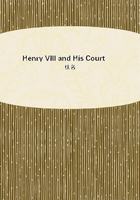
第152章 "LE ROI EST MORT--VIVE LA REINE!"(1)
King Henry lay a-dying. That life full of sin, full of blood and crime, full of treachery and cunning, full of hypocrisy and sanctimonious cruelty--that life was at last lived out. That hand, which had signed so many death-warrants, was now clutched in the throes of death. It had stiffened at the very moment when the king was going to sign the Duke of Norfolk's death-warrant. [Footnote:
historical. The king's own words.--Leti, vol. I, p. 16.] And the king was dying with the gnawing consciousness that he had no longer the power to throttle that enemy whom he hated. The mighty king was now nothing more than a feeble, dying old man, who was no longer able to hold the pen and sign this death-warrant for which he had so long hankered and hoped. Now it lay before him, and he no longer had the power to use it. God, in His wisdom and His justice, had decreed against him the most grievous and horrible of punishments; He had left him his consciousness; He had not crippled him in mind, but in body only. And that motionless and rigid mass which, growing chill in death, lay there on the couch of purple trimmed with gold--that was the king--a king whom agony of conscience did not permit to die, and who now shuddered and was horrified in view of death, to which he had, with relentless cruelty, hunted so many of his subjects.
Catharine and the Archbishop of Canterbury, the noble Cranmer, stood at his bedside: and whilst in convulsive agony he grasped Catharine's hands, he listened to the devout prayers which Cranmer was saying over him.
Once he asked with mumbling tongue: "My lord, what kind of a world then is that where those who condemn others to die, are condemned to die themselves?"And as the pious Cranmer, touched by the agonies and tortures of conscience which he read in the king's looks, and full of pity for the dying tyrant, sought to comfort him, and spoke to him of the mercy of God which has compassion on every sinner, the king groaned out: "No, no! No mercy for him who knew no mercy!"At length this awful struggle of death with life was ended; and death had vanquished life. The king had closed his eyes to earth, to open them again there above, as a guilt-laden sinner in the presence of God.
For three days his death was kept a secret. They wanted first to have everything arranged, and to fill up the void which his death must make. They wanted, when they spoke to the people of the dead king, to show them also at the same time the living king. And since they knew that the people would not weep for the dead, they were to rejoice for the living; since they would sing no funeral psalms, they were to let their hymns of joy resound.
On the third day the gates of Whitehall were thrown open, and a gloomy funeral train moved through the streets of London. In dead silence the populace saw borne past them the coffin of the king, before whom they had trembled so much, and for whom they now had not a word of mourning or of pity--no tears for the dead who for seven-and-thirty years had been their king.
They were bearing the coffin to Westminster Abbey to the splendid monument which Wolsey had built there for his royal master. But the way was long, and the panting horses with black housings, which drew the hearse, had often to stop and rest. And all of a sudden, as the carriage stood still on one of the large open squares, blood was seen to issue from the king's coffin. It streamed down in crimson currents and flowed over the stones of the streets. The people with a shudder stood around and saw the king's blood flowing, and thought how much blood he had spilt on that same spot, for the coffin was standing on the square where the executions were wont to take place, and where the scaffolds were erected and the stakes set. As the people stood gazing at the blood which flowed from the king's coffin, two dogs sprang forth from the crowd and, with greedy tongue, licked the blood of King Henry the Eighth. But the people, shuddering and horror-stricken, fled in all directions, and talked among themselves of the poor priest who a few weeks before was executed here on this very spot, because he would not recognize the king as the supreme lord of the Church and God's vicegerent; of that unfortunate man who cursed the king, and on the scaffold said: "May the dogs one day drink the blood of this king who has shed so much innocent blood!" And now the curse of the dying man had found its fulfilment, and the dogs had drunk the king's blood. [Footnote:
Historical.--See Tytler, p. 481.]
When the gloomy funeral train had left the palace of Whitehall, when the king's corpse no longer infected the halls with its awful stench of corruption, and the court was preparing to do homage to the boy Edward as the new king, Thomas Seymour, Earl of Sudley, entered the room of the young royal widow. He came in a magnificent mourning suit, and his elder brother, Edward Seymour, and Cranmer, archbishop of Canterbury, walked by his side.
With a blush and a sweet smile, Catharine bade them welcome.